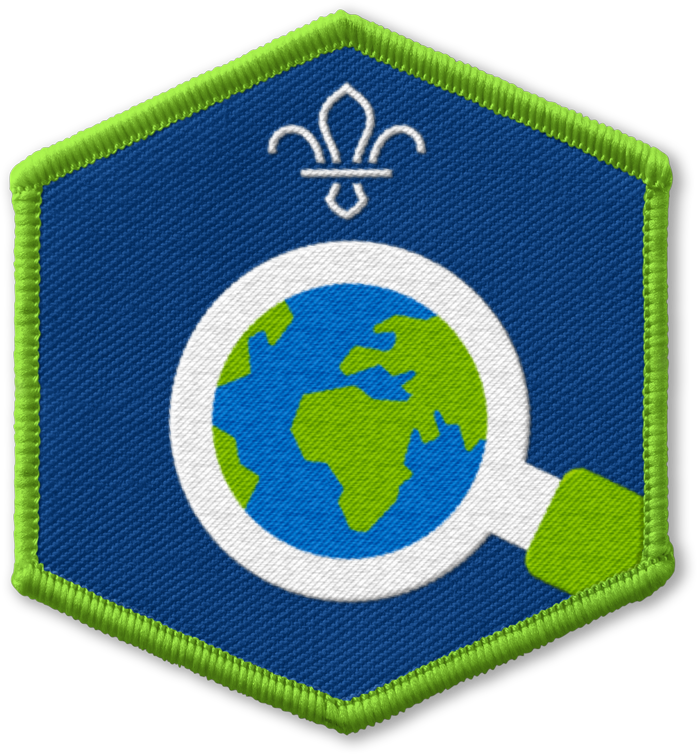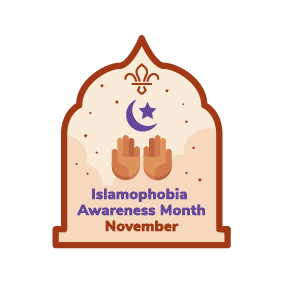
Visit a mosque to learn about Islam
You’ll need
- Pens or pencils
- A4 paper
- Coloured pens or pencils
- Printed copies of the ‘Discovery hunt sheets’
- Cameras or devices to take photos (if allowed)
Before you begin
- Use the safety checklist to help you plan and risk assess your activity. Take a look at our guidance to help you carry out your risk assessment, including examples.
- Make sure all young people and adults involved in the activity know how to take part safely.
- Make sure you’ll have enough adult helpers. You may need some parents and carers to help if you’re short on helpers.
Scouts is open to everyone. We don’t identify exclusively with one faith, and we welcome people of all faiths and of none.
We know it’s important for people to learn about each other, including understanding different faiths and beliefs. Scouts always respects people’s beliefs, faiths and cultures, and everyone should be open to learn.
As an inclusive and values based movement, we support our members to engage and learn about different faiths and beliefs in an exciting and meaningful way, even if they don’t have a faith themselves.
Celebrating and understanding differences, including differences in faiths and beliefs, is an important part of our Scout values, which are:
- Integrity: We act with integrity; we are honest, trustworthy and loyal.
- Respect: We have self-respect and respect for others.
- Care: We support others and take care of the world in which we live.
- Belief: We explore our faiths, beliefs and attitudes.
- Co-operation: We make a positive difference; we co-operate with others and make friends.
Our value of Belief and its exploration helps Scouts to learn from other faiths and beliefs. This encourages them to develop or build their personal beliefs and understand their shared values, whether faith-based on not.
We know that learning about faiths, beliefs and different attitudes can help to break down barriers, helps us all to recognise what we have in common, and teaches us to value and respect other people. It also helps us to build up respect, acceptance and knowledge for each other, leading to a more co-operative and inclusive society.
In our diverse society, people can sometimes feel cautious talking about this sensitive subject. However, it's important that Scouts offers young people safe, exciting and open spaces to explore faiths and beliefs. They should be able to engage in personal reflection, as they question and develop their opinions and understanding of the world around them.
Making time for personal reflection and developing our beliefs means exploring the places, people, communities, celebrations or stories which hold meaning for us, and it may not necessarily mean exploring a faith.
For example, someone’s shared values may be their Scout Values and that person may choose to reflect on them at important times, such as when they make their Promise. Others may choose to reflect at certain times of the year, such as a faith-based festival, birthdays, meaningful events or at New Year. Some people may still celebrate events, such as Christmas, but use it as a time to celebrate family, friends and loved ones, as well as for charity and giving.
Discover more about Faiths and Beliefs in Scouts.
- A mosque is a place where Muslims come together for collective prayers, and it is also space for individual prayer. Mosques are usually open for worship at any time.
- Muslims pray five times a day, at home or at the mosque.
- On Friday afternoons, Muslims gather to worship together in the mosque and listen to a sermon from an imam (a person who leads prayer in Islam). This is called Jummah and it's a congregational prayer (read collectively). It takes place instead of the normal midday prayer which is called Zuhr.
- A mosque is also a place where people gather together in celebration, for example, during the festival of Eid al-Fitr, which marks the end of the holy month of Ramadan.
- They're also a place of religious study, where Muslims study the Qur'an (the holy book of Islam), the life of the prophets, the five pillars of Islam, and how to put their faith into practise as a good Muslim and citizen.
- Mosques are also used as spaces for learning and activities to support the community. From coming together to celebrate festivals, to hosting food banks, to running youth clubs.
- The Arabic word for mosque is ‘masjid’.
- There are over 1,500 mosques in the UK.
- The UK’s first mosque was built in Woking in Surrey in 1889.
- The largest mosque in the world is in Makkah (often spelt Mecca), in Saudi Arabia. Every year, millions of Muslims visit as part of Hajj – a pilgrimage.
- Mosques often have beautiful architecture and design. They usually have some unique features:
- Minaret: The Minaret probably be the first thing you notice on your way to the mosque. It’s a tall tower, traditionally used for the call to prayer.
-
- Ablution area or the Wudu area: The Ablution or Wudu area is a place to wash. Before prayer, Muslims wash their face, arms, head and feet in a special way called wudu. This acts as a physical and spiritual cleansing before they pray to God.
-
- A prayer hall: The prayer hall is a large open space where Muslims come together to pray to Allah. In most mosques, women and men pray separately. People use prayer mats, rather than chairs, if they’re able.
-
- Dome or qubba: There’s usually a dome above the prayer hall. It sometimes represents the vault of heaven, or Allah’s universe.
-
- Mihrab: The Mihrab is an alcove in the wall of the prayer hall, showing the direction of Mecca, which Muslims face when praying. It’s usually shaped like a doorway, and is highly decorated, so it stands out.
-
- Minbar: The Minbar is a raised platform in the prayer hall, from which sermons or speeches are given. It's usually made of carved wood, stone, or brick, and includes a short staircase. It's usually found to the right of the mihrab.
-
- Decorations: Walls are often decorated with calligraphy of passages from the Qur'an, and decorative patterns. You might also see mosaics and hanging lamps. You probably won’t find any pictures or statues.
Planning your visit
- Get in touch with your local mosque to find out if you can arrange a visit on a suitable day or time. You could search online for mosque or ‘masjid’, which is the Arabic word for mosque. Many mosques hold open days or run tours for groups.
- You could get in touch with the Muslim Scout Fellowship (MSF) and see if there are any nearby Muslim Scout groups you could link up with. You can also find your nearest group on the MSF website.
Preparing for your visit
- You should find out if there are any rules or guidelines the group will need to follow on the visit, such as dress code.
- It’s usually encouraged for everyone to dress modestly, with clothes that cover the arms and legs, and are not tight fitting. Women and girls may also be asked to cover their heads.
- Check if there are any guidelines people need to follow as they’re exploring. People will probably be asked to take off their shoes when entering the mosque or before entering the prayer area, and you’ll need to be quiet or silent if people are praying.
- Check if people will be allowed to take photos in the mosque.
- Make sure to ask if there are any prayer times or other activities that you’ll need to be aware of.
- You might want to visit the mosque in advance to check any accessibility requirements, get to know the hosts and learn your way around, so you can best support the group and note any accessibility requirements.
- Follow your hosts lead on how to greet each other when you meet. Remember, Muslims traditionally shake hands with the right hand and with the same gender only. If they’re greeting the opposite gender, they’ll probably opt for a friendly smile.
Planning and setting up this activity
- Share your ideas for the discovery hunt or quiz sheet with your hosts and find out about the features of the mosque. They might have some great ideas, too. We’ve shared some ideas on this page, which you can adjust according to your local mosque and the needs of your group.
- Bear in mind you will probably be guided around the mosque and may need to stay together as a whole group.
- Work together to agree something that everyone is happy with. Ask if people will be able to take photos or if it’s OK for them to approach people to ask questions. If not, think about other ways people could get involved. Your discovery hunt could involve writing down and drawing things, or finding the answer to a question, rather than asking someone.
- Prepare discovery hunt sheets or quiz sheets. You could divide everyone into groups and give them one each, or everyone could have one each.
- A copy of the Qur’an. Note down where you found it.
- A hanging lamp. Draw what it looks like.
- A prayer mat. Draw what it looks like, including noting down it’s shape and colour. What shape is on the mat? Have you seen this shape somewhere else?
- Find one way that the mosque supports the local community. Write it down.
- The crescent moon symbol. Make a note of where you found it and draw what it looks like.
- The minbar (a raised platform used for giving sermons or speeches). Write down the number of steps.
- The name of a person who leads prayer in Islam.
- A pair of blue shoes. Take a photo.
- Clue: People take off their shoes before entering the prayer area.
- Write down the next prayer time for today.
- Clue: Try looking for a set of clocks.
- A minaret (a tall tower). Take a photo of the minaret.
- Clue: You might need to head outside for this one.
- What do you think it’s for?
- Bonus point – find out how tall it is.
- The year the mosque was established.
- The word Allah in Islamic calligraphy. Make a note of where you found it.
- A set of prayer beads. Count and write down how many beads it has.
- The direction of Mecca from where you are.
- Clue: This is the direction Muslims will pray in. There’ll be a special alcove that shows the direction.
- The Mihrab shows the direction of Mecca, which Muslims face when praying. This is:
- An alcove
- A cross
- A window
- True or false: A mosque is used for prayer only.
- True
- False
Mosques are also used as spaces for learning and activities to support the community. From coming together to celebrate festivals, to hosting food banks, to running youth clubs.
- The holy book of Islam is called the:
- Torah
- Qur’an
- Bible
- What day of the week do Muslims come together at the mosque for collective prayer?
- Friday
- Saturday
- Sunday
- What may be found hanging from the ceiling in a mosque?
- Lamps
- Crosses
- Stars
- What do Muslims use when praying?
- Prayer mats
- Chairs
- Cushions
- What will you not usually find in a mosque?
- Statues
- Calligraphy
- Mosaics
- What can often be found on top of a mosque?
- A triangular flag
- A tall tower
- A star
The session before your visit
- In the session before the visit, spend some time as a group talking about what you know about mosques.
- Tell everyone that you’ll be visiting a mosque and taking part in a discovery hunt there to help everyone find out more about both Islam and the mosque. Explain that one of the Scouts values is beliefs. Scouts always respect people’s beliefs, faiths and cultures, and everyone should be open to learn.
- Explain that a mosque is a place where Muslims come together to pray, and study teachings from the Qur’an. Mosques are an important part of the community, too. There are over 1,500 mosques in the UK and Islam is the second largest religion in the UK.
- Tell everyone that the traditional Islamic greeting is ‘Assalamu- alaikum’, which means ‘peace be upon you’ and ‘alaikum’ is pronounced ‘a-lay-kum’. You could practise saying it before your visit. It’s OK to just to say hi or hello too!
- Explain that on your visit you might see some of a mosque's unique features. If the mosque has one, the Minaret will probably be the first thing you notice on your way there. It’s a tall tower, traditionally used for the call to prayer.
You can find more information about the features of a mosque on this page.
- People could think about anything they want to find out and anything they want to ask. It’s always good to be prepared.
- Ask people for questions or things that they want to find out. You could get people to write them on sticky notes in small groups, then share them by putting them on a bigger piece of paper.
- Remind everyone that they need to be respectful during their visit. Everyone should think about what this means and share their suggestions. Some suggestions could include:
-
- Remembering it’s a place people may be worshipping or praying. People need to try to be quiet, not disturb anyone who’s praying and putting their devices or phones on silent.
- People should avoid touching anything unless they’re told it’s OK to, as some of the objects may be sacred or delicate.
- Following the dress code and removing shoes.
Arriving at the mosque
- Greet everyone outside the mosque on arrival and remind everyone to be quiet and respectful. Make sure everyone knows any specific rules or guidelines, such as removing shoes in certain areas.
- At the start of the visit, gather everyone together. You could see if anyone can remember any features of the mosque that you discussed in the last session.
- If you’re having a tour or talk, it may be best to do this first, as a nice introduction to the mosque. Remember, leave time at the end for questions.
Complete your discovery hunt
- Split everyone into teams and give each group a discovery hunt sheet.
- Remind people again of any rules and guidelines they need to follow, including where they can or can’t go, what they can draw or take pictures off, and who they can ask questions to (if anyone).
- Everyone should look around the location and try to complete their discovery hunt.
At the end of the visit
- At the end of the visit, everyone should gather back together and reflect on what they’ve learned. Did everyone manage to complete their discovery hunt?
- Ask if anyone learned anything new. It might’ve been people’s first time visiting a mosque or interacting with the Muslim faith.
- Ask everyone if the mosque looked like you expected it to. Was there anything you expected to see which wasn’t there? People may have noticed there were no images or statues of Allah or the prophets. Why do people think that is?
- Ask if anyone was surprised or interested in anything you saw or found out.
- Ask everyone how a mosque is similar or different to other places of worship you may have seen.
- Everyone should think about how they’d like to thank the mosque for hosting them. You may want to write a card or simply say thank you.
After the visit
- Take some time to reflect on your visit. It’s up to you whether you return to your normal meeting place and talk there, or whether you stay at the place of worship and ask parents and carers to collect everyone from there.
- What did you like about the mosque? What did you find interesting about it? Has your visit changed your perception of other people’s beliefs and faiths?
- Ask everyone why it’s important for people to learn about each other's faiths and beliefs, even if we don’t have a faith ourselves, and what’s important to them? It can help us understand, respect and relate to others, and it also gives us opportunity to reflect on our own personal beliefs and values.
- Ask why places of worship are important for people. They're a space people can gather, pray and celebrate. They’re also a calm space to reflect.
- Think about a place that’s special to you, makes you feel calm or allows you to be relaxed and how happy you feel there. It might be a youth group, a community centre, a place of worship, Scouts or your local football club. That’s how some people feel about the place they go to worship or to share in their found community.
Thank you to the Stafford Muslim Prayer Hall for sharing your insights and ideas, to help us develop this activity.
Reflection
This activity was an opportunity to get to know more about a particular faith and learn about your community.
You could take the opportunity of being in the calm and contemplative environment of the mosque to spend time reflecting. You could combine some quiet time for people to reflect individually, and some discussion as a group.
Safety
All activities must be safely managed. You must complete a thorough risk assessment and take appropriate steps to reduce risk. Use the safety checklist to help you plan and risk assess your activity. Always get approval for the activity, and have suitable supervision and an InTouch process.
- Visits away from your meeting place
Complete a thorough risk assessment and include hazards, such as roads, woodland, plants, animals, and bodies of water (for example, rivers, ponds, lakes, and seas). You’ll probably need more adult helpers than usual. Your risk assessment should include how many adults you need. The young people to adult ratios are a minimum requirement. When you do your risk assessment, you might decide that you need more adults than the ratio specifies. Think about extra equipment that you may need to take with you, such as high visibility clothing, a first aid kit, water, and waterproofs. Throughout the activity, watch out for changes in the weather and do regular headcounts.
You can choose items for your discovery hunt that will be easier or more difficult to find, and choose how many items you want to include.
If you’re unable to visit a mosque, here are some ways you can explore online:
- Watch this animated video about features of a mosque
- Explore this clickable image of a mosque
- Watch this video about the East London Mosque
- Take a virtual tour of a mosque
- Get in touch with the place you’re visiting and ask about accessibility. Does it meet everyone’s needs? You may need to think about level access, suitable toilets, or quiet spaces where people can take a break if they need to.
All Scout activities should be inclusive and accessible.
If you enjoyed this activity, you may want to look at our badges to do with World Faiths.
If you’ve any Muslim members in your group, you could offer them the opportunity to share their experiences, but only if they want to and are comfortable to do so. You may want to ask or chat to them before the session, so they don’t feel put on the spot or singled out.





